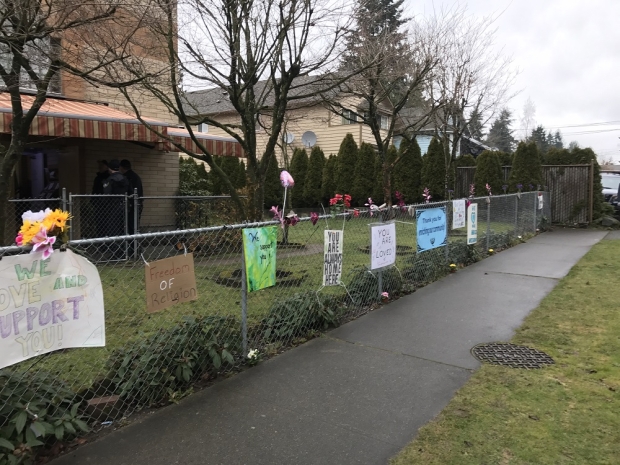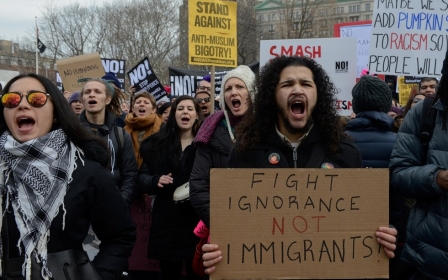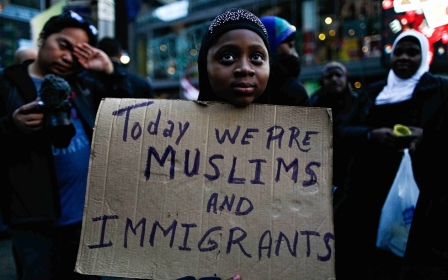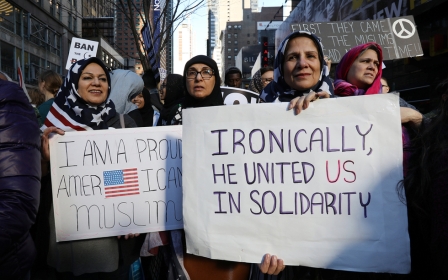Sanctuary city Seattle is ‘open to all,’ declares mayor Murray at mosque
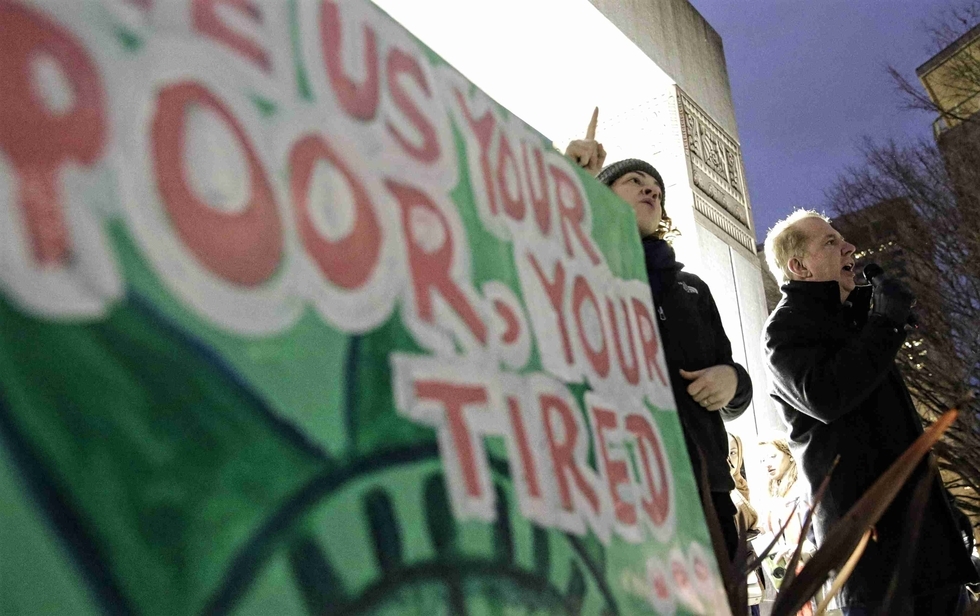
The welcoming signs hung on the fence went all around the corner lot: “We love our Muslim neighbours.” “Thank you for enriching our community.” “You are loved and welcome.” “Our [Jewish] family is so happy you are here, at home.”
The mayor of Seattle was giving his “state of the city” address at a mosque.
'Seattleites are building community. We are spreading our arms, and opening our hearts'
- Mayor Ed Murray
Looking up, one saw the architectural elegance of the Idriss Mosque, the oldest traditional-style mosque in the US west of the Mississippi river. This was the North Seattle venue that mayor Ed Murray had chosen for his annual speech, a departure from the usual locale, in downtown City Hall.
The handmade signs had gone up weeks earlier, in protest at President Donald Trump’s Islamophobic policies, including the executive order banning refugees and immigrants from seven majority-Muslim countries.
As the crowd trickled in, past a heavy police presence, metal detectors and a checkpoint that many said reminded them of airport security, attendees were welcomed again, this time by Hisham Farahallah, the secretary of the Idriss Mosque Board of Trustees, who thanked people for attending the event.
“By gracing us here, you have touched the hearts of Muslims across the nation,” he said. Farahallah introduced Murray, who opened his address with a note of empowerment, vowing not to be demoralised by the bleakness of the national political scene.
'For the soul of America'
Citing racist and xenophobic precedents to the current Islamophobic climate in the country, from the Chinese Exclusion Act of 1882 to the Japanese internment during the second World War, Murray said, “We are here because we are a welcoming city. We stand in solidarity with our Muslim neighbours.”
Murray was bluntly critical of Trump, explaining that “the next four years [of Trump’s Administration] will be a battle for the soul of America”. But the mayor also sounded optimistic about his city, as he observed that “in contrast to the president’s politics of polarisation, Seattleites are building community. We are spreading our arms, and opening our hearts”.
Murray touched on many topics, from homelessness to wage disparity to police accountability and public education, but he kept coming back to what he described as a “fundamental value of this city,” namely “remaining open to all”.
The decision to give the “state of the city” address at a mosque was announced on 13 February, after three reported Islamophobic attacks in the area.
While Seattle is seen as one of the more liberal cities in the US, it has not been totally immune to the hostile national climate. Two mosques have recently been vandalised in the Seattle area.
In January 2017, the Islamic Center of the Eastside, also known as “the Bellevue Masjid,” just outside of Seattle, was engulfed in forty-foot flames that badly damaged the building in confirmed arson. Police arrested Isaac Wayne Wilson, a 37-year old local white man who had previous disruptive contacts with the mosque.
Sanctuary city
Seattle is one of the few “sanctuary cities” in the country that have openly defied Trump’s anti-immigration policies. The designation “sanctuary city” was first used in the US in 1979, in Los Angeles, California. While the designation does not carry a legal meaning, sanctuary cities do not inquire about a resident’s immigration status before dispensing services, and usually forbid their police from inquiring about a person's immigration status or share such information with immigration enforcement.
'No one is above the law - not even the President'
- Bob Ferguson, Washington AG
Some states, including Georgia, Arizona and Tennessee, have no sanctuary cities at all and have strict anti-immigration policies. On the other hand, the entire state of Oregon, just south of Washington, is a “sanctuary state,” the only such state in the country.
As he vowed to continue making Seattle safe for all its residents, Murray announced that he will be filing a number of Freedom of Information Act requests of the Trump Administration, to find out exactly what the president’s new plans for immigrants, refugees, and “Dreamers” were.
“We are a welcoming city, a city that breaks down walls,” he asserted. “And we will take legal action if the government doesn’t answer our FOI requests.”
Indeed, Washington state has taken the national lead in challenging President Donald Trump’s “Immigrant and Muslim Ban”. Attorney General Bob Ferguson filed a lawsuit against the administration, declaring the ban unconstitutional.
Ferguson had argued that the executive order violates the US Constitution’s guarantee of Equal Protection and the First Amendment’s Establishment Clause, infringes upon people’s constitutional right to due process, and contravenes the federal Immigration and Nationality Act.
Washington Governor Jay Inslee was in full support of Ferguson, stating at a joint press conference with the attorney general that “never has our system of checks and balances been more important. Washington is filing the first suit of its kind in the nation, thanks to the good work of Attorney General Ferguson and his team”.
Inslee then added, again expressing Washington’s defiant attitude: “Until Congress takes this Administration to task for the obvious moral and legal injuries suffered by innocent, law-abiding people entering our country, it is up to states to protect and promote the rights of the people who reside in our borders.”
Sitting in the Idriss Mosque, Seattleties appeared to feel empowered, as Murray again contrasted the people and the president.
“The reactionary underpull of this nation’s politics will not stop us on our journey towards justice,” he said, before assuring us that “the people, not the president, will have the last word.”
As he thanked residents again for coming to Idriss Mosque, Farahallah pointed at the floral bouquets decorating the mosque. Vases were everywhere.
“We did not buy those,” Farahallah said. They are from our neighbours, our community.
To anxious attendees, the mosque must have felt as it should - a sanctuary.
Middle East Eye propose une couverture et une analyse indépendantes et incomparables du Moyen-Orient, de l’Afrique du Nord et d’autres régions du monde. Pour en savoir plus sur la reprise de ce contenu et les frais qui s’appliquent, veuillez remplir ce formulaire [en anglais]. Pour en savoir plus sur MEE, cliquez ici [en anglais].


